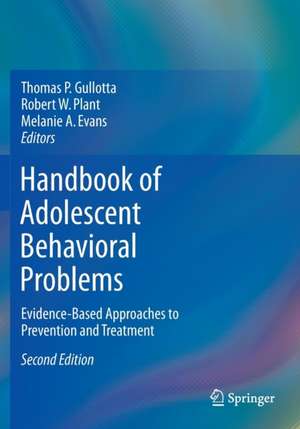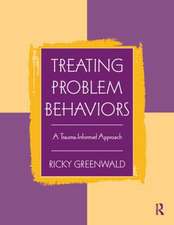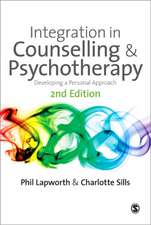Handbook of Adolescent Behavioral Problems: Evidence-Based Approaches to Prevention and Treatment
Editat de Thomas P. Gullotta, Robert W. Plant, Melanie A. Evansen Limba Engleză Paperback – 19 noi 2015
Key topics addressed include:
- Families and adolescent development.
- Adolescent mental health and the DSM-5.
- Oppositional Defiant Disorder and Conduct Disorder.
- Autism spectrum disorder.
- Media and technology addiction.
- School failure versus school success.
- Bullying and cyberbullying.
| Toate formatele și edițiile | Preț | Express |
|---|---|---|
| Paperback (1) | 1671.81 lei 6-8 săpt. | |
| Springer Us – 19 noi 2015 | 1671.81 lei 6-8 săpt. | |
| Hardback (1) | 1738.26 lei 6-8 săpt. | |
| Springer Us – 15 oct 2014 | 1738.26 lei 6-8 săpt. |
Preț: 1671.81 lei
Preț vechi: 2038.80 lei
-18% Nou
Puncte Express: 2508
Preț estimativ în valută:
319.91€ • 342.08$ • 266.73£
319.91€ • 342.08$ • 266.73£
Carte tipărită la comandă
Livrare economică 17 aprilie-01 mai
Preluare comenzi: 021 569.72.76
Specificații
ISBN-13: 9781489976741
ISBN-10: 1489976744
Pagini: 697
Ilustrații: XXXIII, 697 p. 7 illus.
Dimensiuni: 178 x 254 x 43 mm
Greutate: 13.5 kg
Ediția:2nd ed. 2015
Editura: Springer Us
Colecția Springer
Locul publicării:New York, NY, United States
ISBN-10: 1489976744
Pagini: 697
Ilustrații: XXXIII, 697 p. 7 illus.
Dimensiuni: 178 x 254 x 43 mm
Greutate: 13.5 kg
Ediția:2nd ed. 2015
Editura: Springer Us
Colecția Springer
Locul publicării:New York, NY, United States
Public țintă
Professional/practitionerCuprins
Section I: Introduction and Overview.- Chapter 1. An Overview of Adolescent Development.- Chapter 2. From Theory to Practice: Treatment and Prevention Possibilities.- Chapter 3. DSM V and Adolescent Behavioral Problems.- Chapter 4. Biological / Genetic Influences on Adolescent Development.- Chapter 5. Family Influences on Adolescent Development.- Chapter 6. Community Influences on Adolescent Development.- Chapter 7. Evidence-Based Practice.- Section II: Disorders.- Chapter 8. Intellectual Disabilities.- Chapter 9. Communication and Learning Challenges.- Chapter 10. School Failure.- Chapter 11. Anxiety Disorders.- Chapter 12. Posttraumatic Stress Disorder.- Chapter 13. Attention-Deficit Hyperactivity Disorder.- Chapter 14. Depression.- Chapter 15. Bipolar Disorder.- Chapter 16. Suicide.- Chapter 17. Oppositional Defiant Disorder and Conduct Disorder.- Chapter 18. Obesity.- Chapter 19. Eating Disorders.- Chapter 20. Autism.- Chapter 21. Schizophrenia.- Section III: Problem Behaviors.- Chapter 22. Media/technology addiction.- Chapter 23. Bullying.- Chapter 24. Delinquency.- Chapter 25. Gangs.- Chapter 26. Homicide.- Chapter 27. Substance Misuse.- Chapter 28. Gambling.- Chapter 29. Adolescent Sex Offenders (Include incest here).- Chapter 30. Dating Violence.- Chapter 31. Adolescent Pregnancy.- Chapter 32. Physical / Emotion Abuse and Neglect.- Chapter 33. Self-Inflicted Harm.- Section IV: Services and Conclusion.- Chapter 34. Young Adult Services.- Chapter 35. Epilogue.
Recenzii
“This book discusses theoretical and treatment approaches to DSM-5 childhood diagnostic categories, along with specific problem areas as well as prevention methods. … The intended audience is practitioners, policymakers, and human service directors, as well as graduate students in the helping professions. … This book does a good job of covering a number of DSM-5 diagnostic categories and behavior problems. With the introduction of DSM-5, this update was necessary.” (Gary B. Kaniuk, Doody's Book Reviews, May, 2016)
Notă biografică
Thomas P. Gullotta is C.E.O. of Child and Family Agency and is a member of the psychology and education departments at Eastern Connecticut State University. He is the senior author of the 4th edition of The Adolescent Experience, co-editor of The Encyclopedia of Primary Prevention and Health Promotion, and editor emeritus of the Journal of Primary Prevention. He is the senior book series editor for Issues in Children's and Families' Lives. He has published extensively on young people and primary prevention. In 1999, Tom was honored by the Society for Community Research and Action, Division 27 of the American Psychological Association with their Distinguished Contributions to Practice in Community Psychology Award.
Robert W. Plant, Ph.D. is a licensed clinical psychologist and the Senior Vice President for Quality and Innovation at Value Options - CT Behavioral Health Partnership. Dr. Plant received his doctorate from The University of Rochester and has been an adjunct member of the faculty at Yale University Medical School since 2003. Over the last twenty years he has overseen the management of mental health services and service systems and has been a major contributor to the dissemination of evidence based practices in Connecticut. Dr. Plant is expert in the development of performance improvement programs for behavioral health.
Melanie A. Evans, Ph.D., is an Associate Professor of Psychology at Eastern Connecticut State University. She earned her M.S. and Ph.D. from Syracuse University and A.B. from Vassar College. Her research interests broadly revolve around child and adolescent development in diverse cultures (e.g., African American, Caribbean immigrant) and contexts (e.g., school and extra-curricular settings, family relationships). Much of her research has focused on factors (e.g., individual, family) that impact academic outcomes for adolescents.
Robert W. Plant, Ph.D. is a licensed clinical psychologist and the Senior Vice President for Quality and Innovation at Value Options - CT Behavioral Health Partnership. Dr. Plant received his doctorate from The University of Rochester and has been an adjunct member of the faculty at Yale University Medical School since 2003. Over the last twenty years he has overseen the management of mental health services and service systems and has been a major contributor to the dissemination of evidence based practices in Connecticut. Dr. Plant is expert in the development of performance improvement programs for behavioral health.
Melanie A. Evans, Ph.D., is an Associate Professor of Psychology at Eastern Connecticut State University. She earned her M.S. and Ph.D. from Syracuse University and A.B. from Vassar College. Her research interests broadly revolve around child and adolescent development in diverse cultures (e.g., African American, Caribbean immigrant) and contexts (e.g., school and extra-curricular settings, family relationships). Much of her research has focused on factors (e.g., individual, family) that impact academic outcomes for adolescents.
Textul de pe ultima copertă
The Second Edition of the Handbook of Adolescent Behavioral Problems clarifies the current state of treatment and prevention through comprehensive examinations of mental disorders and dysfunctional behaviors as well as the varied forces affecting their development. New or revised chapters offer a basic framework for approaching mental health concerns in youth and provide the latest information on how conditions (e.g., bipolar disorder, suicidality, and OCD) and behaviors (e.g., sex offenses, gang activities, dating violence, and self-harm) manifest in adolescents. Each chapter offers diagnostic guidance, up-to-date findings on prevalence, biological/genetic aspects, risk and resilience factors, and a practical review of prevention and treatment methods. Best-practice recommendations clearly differentiate among what works, what might work, what doesn't work, and what needs further research across modalities, including pharmacotherapy.
Key topics addressed include:
Key topics addressed include:
- Families and adolescent development.
- Adolescent mental health and the DSM-5.
- Oppositional Defiant Disorder and Conduct Disorder.
- Autism spectrum disorder.
- Media and technology addiction.
- School failure versus school success.
- Bullying and cyberbullying.
Caracteristici
The essential Second Edition updates the leading evidence-based reference on adolescent behavioral problems
Provides expanded, updated coverage of the latest scientific theory and research, clinical guidelines, and real-world, evidence-based interventions
Embraces a biopsychosocial approach to prevention and treatment
Discusses individual, family, and community factors influencing risk and resilience during adolescence
Provides expanded, updated coverage of the latest scientific theory and research, clinical guidelines, and real-world, evidence-based interventions
Embraces a biopsychosocial approach to prevention and treatment
Discusses individual, family, and community factors influencing risk and resilience during adolescence












